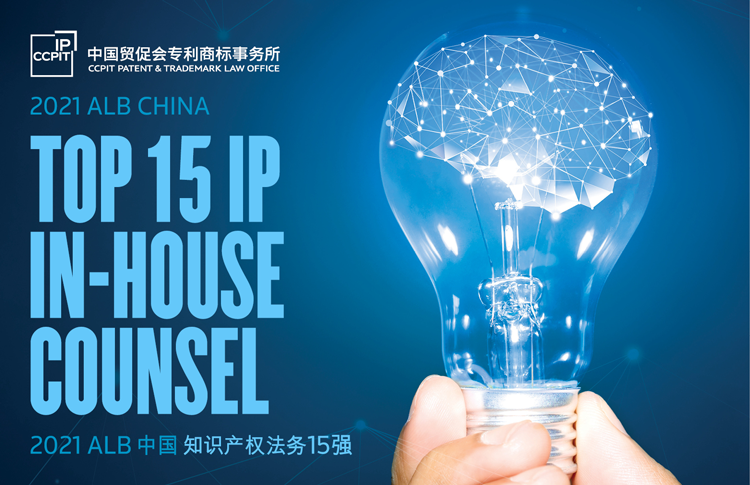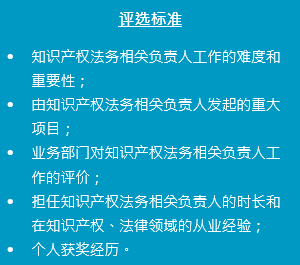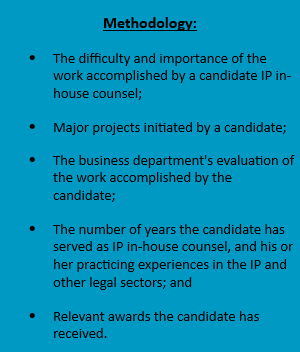 今年上榜的知识产权法务们借助中国知识产权强保护的东风,对企业知识产权成果做出了更具创新性的保护和更为前瞻性的布局。ALB衷心祝贺这些帮助企业不断攀登技术高峰的“幕后英雄”,也期待他们在未来取得更多精彩。
今年上榜的知识产权法务们借助中国知识产权强保护的东风,对企业知识产权成果做出了更具创新性的保护和更为前瞻性的布局。ALB衷心祝贺这些帮助企业不断攀登技术高峰的“幕后英雄”,也期待他们在未来取得更多精彩。
|
采健 崔玲玲 胡荟集 刘肖琛 青馨雨 田波 邢伟 许法磊 严敏亚 张祖原 张喆 赵杰 周菲 周奇 邹旭仔 |
过去一年,随着多项知识产权领域法律法规的颁布和更新,中国对知识产权(IP)的保护进一步增强。知识产权法务们的工作也更加如火如荼地展开。即使受到新冠疫情、中美摩擦等因素的冲击,也无碍他们取得卓越成绩。
 过去一年,《民法典》颁布,《著作权法》《专利法》《商标法》等部门法也进行了与时俱进的修改,对知识产权领域产生了深远影响。根据新华网,11月11日,十三届全国人大常委会第二十三次会议表决通过了关于修改著作权法的决定,自2021年6月1日起施行。修改后的著作权法完善了网络空间著作权保护的有关规定,特别是大幅提高侵权法定赔偿额上限和明确惩罚性赔偿原则等,为创作者们维护自身合法权益进一步“撑腰”。北京爱奇艺科技有限公司高级法务总监胡荟集表示:“新修《著作权法》正式引入‘惩罚性赔偿’制度,立场鲜明地表达出立法对于著作权强保护的态度,这一制度的引入对互联网视频行业的影响尤为突出。”
过去一年,《民法典》颁布,《著作权法》《专利法》《商标法》等部门法也进行了与时俱进的修改,对知识产权领域产生了深远影响。根据新华网,11月11日,十三届全国人大常委会第二十三次会议表决通过了关于修改著作权法的决定,自2021年6月1日起施行。修改后的著作权法完善了网络空间著作权保护的有关规定,特别是大幅提高侵权法定赔偿额上限和明确惩罚性赔偿原则等,为创作者们维护自身合法权益进一步“撑腰”。北京爱奇艺科技有限公司高级法务总监胡荟集表示:“新修《著作权法》正式引入‘惩罚性赔偿’制度,立场鲜明地表达出立法对于著作权强保护的态度,这一制度的引入对互联网视频行业的影响尤为突出。”
百度公司知识产权总监崔玲玲对相关法律的新修也同样感到欣喜,她说:“近两年来,知识产权立法政策的密集修改、发布,全面加强知识产权保护,强化全链条保护,已经构建了更加严密高效的知识产权保护体系。例如,新修改的专利法、著作权法将法定侵权赔偿额上限提升至500万元,并规定了最高5倍的惩罚性赔偿,全面加大了专利权与版权的保护与侵权惩罚力度。这必将进一步激发创新型企业的创新活力。我们欣喜于中国知识产权保护的全面加强。这将为未来知识产权发挥作用提供更广阔的舞台。”
此外,为了配合爱奇艺的出海项目,胡荟集还带领团队专门组建了海外维权团队,经过近两年的实践,逐步完善了海外知识产权布局及保护,建立了爱奇艺主站及海外站维权联动机制。
百度拥有强大互联网基础的领先AI公司,多年来不断攻克核心技术,掌握自主知识产权。崔玲玲说:“近年来,我们的IP战略始终聚焦关键核心基础技术的知识产权布局和保护,注重探索适合AI产业的专利运营方式,通过专利方式赋能生态伙伴,从而推进AI技术和产业生态的快速发展。比如,百度飞桨是中国目前具有完全自主知识产权的全功能性产业级深度学习平台,百度深度学习相关专利申请量国内企业排名第一。”
然而,尽管中国知识产权相关的法律法规在近几年来不断得到完善,当企业取得了前沿创新成果时,相关法律较为滞后的情况依然存在。胡荟集提出,在面对新的技术创新和新的商业模式时,知识产权法务需要在现有法律框架下,从产品合规、版权风险、内容监控等多个层面不断为新产品提供持续的法律支持。
2020年以来,受疫情影响,爱奇艺开始尝试PVOD观影模式,这一新的观影模式对反盗版的要求极高,为了保障影片的顺利播出,胡荟集和他的团队利用“人工+技术”的双层手段,监控网络盗版,平均每日监测数据过万,为新业务模式的顺利上线提供支持。
百度的知识产权法务们也在积极地与相关部门共同推进规则的完善和行业的发展。以AI为例,崔玲玲表示,一般来说,专利法律政策会根据技术的发展进行相应的调整。存在滞后时,他们不会被动地等待知识产权法律规则的变化,而是会协同行业同行,积极与相关部门沟通,推动规则更好地适应AI技术的发展,从而推动产业的更快发展。
“比如,我们会与WIPO等国际机构积极沟通,以产业代表的身份对涉及AI创新的前沿问题提出建议,共同推进规则有利于产业发展。” 崔玲玲说。
2020年虽然给知识产权法务们带来了法律法规更新完善的“东风”,但也带来了不小的挑战——突然爆发的新冠疫情和摩擦不断的中美局势都给知识产权业务带来了冲击。所幸,得益于富有战略眼光的应对和布局,知识产权法务们依然带领团队做到了“逆风飞翔”。
“面对突如其来的疫情,百度利用在AI领域多年的积累,将AI专利技术快速应用到抗疫前线,将AI专利产品部署到需要的地方,有效地支撑疫情精准防控。”崔玲玲说。她还表示,得益于完善的知识产权管理制度,百度IP团队创新保护工作并没有因疫情而停滞,相反,他们还将抗疫情过程中产生的奇思妙想及时转化成了知识产权。“为了鼓励抗击疫情的创新技术,我们主动深入抗疫项目一线,与研发人员密切合作,设置了抗疫专利特殊奖项,用行动赋能公司AI技术抗疫。通过专利技术赋能抗疫一线,将自动驾驶专利支撑的无人物流车、复工复产技术和服务等输出到抗疫前线,为抗击疫情注入百度专利技术力量。”
除了新冠疫情,面对2020年阴晴不定的国际政治经济局势,严敏亚说:“国际关系错综复杂,中美贸易摩擦不断,我们发现知识产权问题在贸易争端中尤其受到关注,不断提醒我们知识产权保护的重要性。”
2020年,博世集团在华实现销售额约1173亿人民币,较2019年同比增长约9.1 percent,同时,中国首次成为博世集团最大的单一市场。“博世在中国的成功也离不开我们知产人的贡献。” 严敏亚说,“核心技术突破是一个国家和企业发展拥有核心竞争力和竞争优势的关键,而技术本身的优势并不能直接等同于竞争优势和市场优势。我们认为及时进行知识产权布局、实现知识产权价值化是关键。为此,过去几年,我们不断加强同研发部门和其它业务部门的合作,在研究开发等知识创新、技术创新活动中加强了知识产权管理指引,将研发活动、科技创新活动与知识产权管理进行了有效结合,知识产权申请量在过去的几年实现了不断的攀升。同时,我们也加强了知识产权商业化的进程,通过知识产权保护帮助业务部门及时占领市场,获得市场竞争优势。”
技术的发展在推动知识产权成果飞速发展的同时,也催生出许多新型侵权模式。胡荟集表示:“近两年,短视频侵权、黑灰产刷量、以‘共享’为名的租号等侵权行为,已然成为行业重点关注的问题。在面对这些新类型的案件,由于没有在先案例可以参考,我们在诉讼维权时,对法条的理解,不能仅停留于表面,还要探究行业规则、商业模式的本质,了解案件背后的技术原理,结合参考国内外的审判思路,最终制定行之有效的诉讼方案及策略。”
在知识产权法务团队做出努力的同时,有时还要借力于外部律师。聊及与外部律师的合作,胡荟集表示,他们着重考量的因素有两点:一是具备扎实的基本功和过硬的专业素养;二是对互联网行业有相应的了解,对行业问题有一定的判断力。
“一直以来,我们团队和外部律师都保持着良好的合作,在不同的项目中互相学习,实现共赢。”胡荟集说。
知识产权法务不仅是科技进步的守护者,还是科技手段的应用者。作为中国视频娱乐网站头部企业之一,爱奇艺知识产权法务团队将新技术手段运用于包括版权保护在内的多项工作中。胡荟集分享道:“技术创新无疑是支撑影视产业发展的基础,爱奇艺作为一家以科技创新为驱动的娱乐公司,新技术不断赋能内容创作、分发、运营等业务。在版权保护方面,通过DRM(Digital Rights Management)数字版权管理技术、防盗链技术、视频指纹、全端监控等架构实现‘端到端’的全流程版权保护。”
聊及未来发展规划,博世将目光投向了物联网和人工智能等前沿技术领域。严敏亚说:“软件对推动物联网发展起着至关重要的作用,博世认为汽车电子和软件市场正在迅速增长并蕴藏着巨大潜力。作为领先的技术与服务供应商,博世引领物联网、人工智能等技术的发展,着力探索创新技术在智能交通、智能家居、智慧城市和智慧农业等多个领域的应用实践。目前,博世每年投资约37亿欧元用于软件开发,并拥有3万名软件工程师。博世中国是集团创新研发网络中的核心组成部分,在前沿领域不断加强自身创新能力建设。去年成立的博世中国创新与软件开发中心是博世集团首个在中国开设的软件开发中心。博世中国的知识产权部门将紧跟公司软件化转型的脚步,为公司的物联网、人工智能战略发展保驾护航。”
爱奇艺知识产权法务团队则将继续对企业IP布局做出进一步完善。胡荟集说:“在全面加强知识产权保护的背景下,我们将继续完善企业的知识产权保护布局,积极关注行业热点,突破固有模式和思维,探索新型法律问题的解决途径,为爱奇艺保驾护航的同时助力行业发展。”
2021 ALB China Top 15 Intellectual Property In-house Counsel
Supported by China’s strengthened protection on intellectual property, the listed IP in-house counsel are taking IP protection and management strategy to a higher level. As ALB congratulates these behind-the-scene heroes when it comes to their companies’ IP work, we also look forward to more achievements by them in the future.
China promulgated and revised a number of intellectual property (IP) laws and regulations last year to further intensify IP protection. IP legal counsel worked vigorously against the backdrop of COVID-19 pandemic and Sino-U.S. trade friction and made outstanding achievements.
LEGISLATIVE TAILWINDS
 The promulgation of the Civil Code and the timely revisions of the Copyright Law, Patent Law and Trademark Law in the last year have had a far-reaching impact in the IP field. According to Xinhuanet.com, the decision on revising the Copyright Law was adopted at 23rd Session of Standing Committee of the 13th National People's Congress on Nov. 11 last year, and the revised law will take effect on June 1. It perfects the relevant provisions on copyright protection in cyberspace, in particular, greatly increases the upper limit of tort damages and clarifies the principle of punitive damages, to give stronger protection for the legitimate rights and interests of copyright owners. "The newly revised Copyright Law introduces the 'punitive damages' system, manifesting the gesture of strengthening copyright protection through legislation. This system is of particular significance to the Internet video industry," says Hu Huiji, senior legal director at iQIYI.
The promulgation of the Civil Code and the timely revisions of the Copyright Law, Patent Law and Trademark Law in the last year have had a far-reaching impact in the IP field. According to Xinhuanet.com, the decision on revising the Copyright Law was adopted at 23rd Session of Standing Committee of the 13th National People's Congress on Nov. 11 last year, and the revised law will take effect on June 1. It perfects the relevant provisions on copyright protection in cyberspace, in particular, greatly increases the upper limit of tort damages and clarifies the principle of punitive damages, to give stronger protection for the legitimate rights and interests of copyright owners. "The newly revised Copyright Law introduces the 'punitive damages' system, manifesting the gesture of strengthening copyright protection through legislation. This system is of particular significance to the Internet video industry," says Hu Huiji, senior legal director at iQIYI.
Cui Lingling, IP director of Baidu, is very excited about the IP-related legislative changes. "There've been quite some new legislations and revisions of laws in the IP field in the past two years. Now we have a more well-knit and more efficient IP protection system covering all links of the industry. For example, according to the newly revised Patent Law and Copyright Law, the upper limit of the tort damages is up to 5 million yuan ($770,000), and the punitive damages of five times the tort damages will be concurrently imposed, which comprehensively strengthen the protection of patents and copyrights, and meanwhile, intensify the infringement penalties. We believe that the enhanced legal protection for intellectual property rights in China will activate the innovation vitality of innovative enterprises, and create a better environment for IP development," Cui says.
In this context, companies and their intellectual property teams have made work arrangements accordingly.
"iQIYI has been in pursuit of 'Joy and Quality' since its establishment. Our mission is protecting copyrights and safeguarding the healthy development of the copyright industry," Hu tells ALB. "As China introduces policies to strengthen IP protection, iQIYI further improves its IP protection mechanism (covering the links such as application, use and IP rights protection) to realize the all-round and multi-dimensional protection of the trademarks, copyrights, patents and other intangible assets of the company."
Furthermore, under Hu's leadership, an overseas IP protection team was set up two years ago to facilitate iQIYI's overseas projects, which has gradually helped iQIYI optimize the layout and build stronger protection for its overseas intellectual property rights, and establish an IP right protection linkage mechanism between its main website and overseas websites.
As a leader in the AI-ecology field, Baidu never stops its efforts in making breakthroughs in core technologies, and develop intellectual property independently. "Our IP strategy has been focusing on the IP layout and protection for core basic technologies in recent years. And we've been trying to find a patent operation approach that fits the AI industry, and accelerate the development of AI technologies and the industry ecology by empowering our ecological partners through patents. For example, PaddlePaddle is the only full-featured deep-learning platform in China, and its IP right is completely and independently owned by Baidu. Baidu ranks No. 1 in the industry in China in terms of deep-learning related patent applications filed," Cui says.
Although China has been endeavouring to perfect IP-related laws and regulations in recent years, there's still law lag in terms of cutting-edge innovation achievements. While companies work to apply technological innovations and new business models, IP lawyers need to provide continuous supports for new products from the aspects of product compliance, copyright risks, content monitoring, etc. under the existing legal framework, Hu points out.
iQIYI is a frontrunner in the emerging premium video-on-demand (PVOD) sector in China, a new form of online distribution brought about by COVID-19. This new film distribution model has extremely high requirements for anti-piracy. Given that, Hu and his team implemented a "two-tier approach" – manpower + technological means – to monitor online piracy and provide efficient legal support for the launch of the new service, which means the workload of average daily monitoring data exceeding 10,000.
Yan Minya, global VP and head of the intellectual property department at Bosch China, points out that it needs to fully leverage the existing rules. "Before the relevant systems are perfected, we should fully leverage the existing rules and improve internal management, so as to help the company navigate the business growth," she says. When finding that the company encounters law lag related issues, the IP legal counsel of the company should take the role of the right owner, and take the initiative to promptly communicate and work with law enforcement officers at all levels to jointly improve the business environment, she continues.
Baidu's IP team is also actively working together with the relevant authorities to perfect the rules and promote the healthy development of the industry. Taking AI as an example, Cui says that generally speaking, patent laws and policies are adjusted accordingly in light of the development of technology. When discovering law lag related issues, her team will not passively wait for changes to occur to the relevant laws and regulations; instead, they'll work together with industry peers and actively communicate with the relevant authorities to make the changes happen, so that the rules and policies will better adapt to the development of AI technology, thereby accelerating the development of the industry.
"For example, we actively communicate with WIPO and other international organizations, and take up the role of industry representative to put forward suggestions on cutting-edge issues involving AI innovation, in an attempt to jointly promote rule changes that are conducive to industrial development," Cui says.
MEETING CHALLENGES
While the new legislations and revisions of laws and regulations in 2020 have been the tailwinds for the IP sector, the COVID-19 outbreak and Sino-U.S. trade frictions posed challenges to IP lawyers. On the strength of the great insight and strategic layout, the ranked IP legal counsel led their teams to successfully navigate against the wind.
"In the face of the sudden COVID-19 outbreak, Baidu acted quickly to join the battle against the pandemic by deploying its patented AI products where needed, giving effective support for the precise prevention and control of the pandemic," Cui says. Thanks to the sound IP management system, Baidu's IP team was able to continue to steadily push forward its innovation protection work, and even created some new intellectual property in the course of fighting the pandemic. "We took the initiative to be on the frontline of the battle against COVID-19 in an effort to encourage the application of innovative technologies to fight the pandemic. We worked closely with the R&D team, and set up a special anti-epidemic patent award to facilitate fighting the COVID-19 with AI technologies. Baidu's patented technologies have been widely used on the frontline of the battle against the pandemic, such as contact-less logistics through self-driving vehicles," Cui says.
The COVID-19 pandemic, coupled with the uncertain international political and economic situation in 2020, "in particular the trade frictions between China and the United States, has made IP issues more than ever prominent, and kept reminding us of the importance of IP protection," Yan says.
In 2020, the Bosch Group achieved the sales of approximately 117.3 billion yuan in China, with a year-on-year growth of about 9.1 percent, making China the largest single market of the Bosch Group for the first time. "Bosch's success in China is partly attributed to the efforts the IP team," Yan says. "The core technological breakthroughs are the key for a country or an enterprise to develop its core competitiveness and sharpen its competitive edge, but technological advantages are not directly equivalent to competitive edge and market advantage. We believe that the key is to make efficient deployment and management of intellectual property rights exploitation. In this regards, we started to work more closely with the R&D department and other business departments, and strengthen IP management and guidance in R&D activities including knowledge innovations and technical innovations, thereby effectively combining R&D activities, and scientific and technological innovation activities with intellectual property management, and achieving the continuous increase in the number of IP applications filed over the past few years. Meanwhile, we've strengthened the process of commercialization of intellectual property rights, helping business departments to rapidly occupy the market and gain market competitive advantages through IP protection."
JOINING HANDS
Technological development has not only promoted the rapid development of intellectual property, but also brought about many new types of infringements. "Torts such as short video infringements, click farming through black and grey operations, and account leasing in the name of 'sharing' have become the key concerns in the industry. When handling cases of these new types, since there's no previous case to refer to, we need to understand the legal provisions in light of the relevant industry rules, as well as the nature of business, and technical principles, and then formulate effective litigation plan and strategy with reference to the trials of the relevant domestic and overseas cases," Hu says.
"In recent years, there've been a large number of cases involving acts that violate the principle of good faith, such as 'parasitic' use of famous brands, and malicious trademark squatting, which are detestable. Bosch is among those victims. As the relevant authorities have promulgated policies and adopted measures to crack down upon those acts, we also started take administrative, civil and criminal actions to protect our legitimate rights and interests. After we took actions, hundreds of infringing companies took the initiative to change their corporate names; for those who refused to make corrections, we've lodged dozens of civil lawsuits to the court. We've had satisfactory results from the cases that have been concluded," Yan says.
In-house IP teams sometimes need to handle cases together with external lawyers. Talking about the competency of external lawyers they value the most, Hu says that one is having solid basic skills and professional excellence, and the other is having good knowledge of the Internet industry and good judgement of industry issues.
"Our team has been working closely with external lawyers. We can always learn from each other, and achieve win-win results," Hu says.
Yan points out: "we can't expect all external lawyers to be multi-skilling or all-rounders. We choose to work with external lawyers to help us solve problems in certain areas. So, we emphasize on their practice areas and their skills, as well as their sense of service and ability to solve problems. And of course, we believe that it is essential for the lead lawyer to have good conduct."
TECHNOLOGICAL EXPERTISE
IP legal counsel are not only the guardians of technological progress, but also the users of technological means. iQIYI is one of the leading online movie and video streaming websites in China. Its IP team applies new technologies to many of its tasks, including copyright protection. "Nowadays, technical innovation is, without doubt, the foundation supporting the development of the film and television industry. iQIYI is an entertainment company driven by technological innovation, new technology is the power continuously driving content creation, distribution and business operations. In terms of copyright protection, we adopt DRM (Digital Rights Management) digital rights management technology, anti-theft chain technology, video fingerprinting, full-end monitoring and other architectures to realize the 'end-to-end' full-process copyright protection," Hu tells ALB.
Bosch's IP team also actively applies technical means to its work. "Digital office, electronic processes, and big data analysis have been widely used in our daily work of our intellectual property team. For multinational companies like Bosh, it not only significantly improves the work efficiency, but also provides important safeguards for carrying out the IP management in a systematic, process-oriented, standardized and precise way," Yan says.
LOOKING FORWARD
Talking about future development plans, Bosch will focus on cutting-edge technologies such as the Internet of Things and artificial intelligence. "Software plays a vital role in promoting the development of the Internet of Things. Bosch believes that the automotive electronics and software market is growing rapidly and has huge potential. As a leading technology and service provider, Bosch leads the development of the Internet of Things, and artificial intelligence, with the focus on exploring the application of innovative technologies in smart transportation, smart homes, smart cities and smart agriculture. Bosch invests about 3.7 billion euros in software development every year and employs 30,000 software engineers. Bosch China is a core unit of Bosch Group's innovation and R&D network, which continuously strengthens its innovation capabilities in the cutting-edge technological fields. Bosch China Innovation and Software Development Center established last year is the first software development centre of the Bosch Group in China. Bosch China’s intellectual property department will work closely in line with the company's software transformation plan to ensure the strategic development of the Internet of Things and AI-related businesses of the company," Yan says.
iQIYI's IP team will continue to perfect the company's deployment for IP management and protection. "In the context of comprehensively strengthening intellectual property protection, we'll continue to perfect the company's IP protection layout, keep abreast of the industry hot issues, and brainstorm to make breakthroughs and introduce new solutions to new legal issues, to contribute to the development of iQIYI and the development of the industry," Hu says.
To contact the editorial team, please email ALBEditor@thomsonreuters.com.


